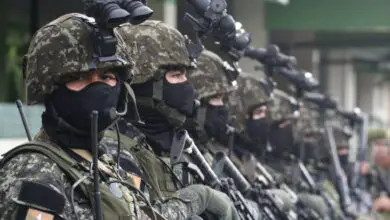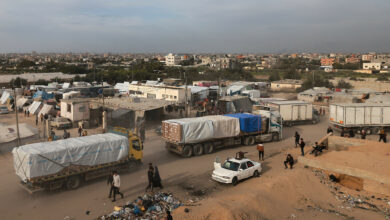
The August Jolo twin suicide bombing attacks in the Philippines demonstrated how familial ties are continuously exploited to forward the Islamic State (IS) agenda. The two-stage suicide attack was conducted by two female terrorists, Indah Nay and Nana, the wives of deceased terrorists Abu Talha and Norman Lasuca.
Family involvement in terrorist attacks is not uncommon. In fact, it is becoming a strategic thrust for IS and the terror groups that have sworn allegiance to the organization.
Against this backdrop, this article explores how terrorist groups in Southeast Asia have exploited familial ties — to devastating effect.
Family Terrorism
Radicalization can be a lengthy process. Iranian Professor Fathali Moghaddam coined the term “staircase of radicalization” to explain the complex process, which involves aggravating grievances and moral disengagement.
However, radicalization through kinship ties appears to hasten the process. Radicalization along this route develops individuals with unconditional loyalty for the radical organization. Associate Professor Julie Chernov Hwang claimed that some individuals are “born into jihad,” explaining that they have been socialized by their living environment to adopt an extremist worldview. Terrorism expert Sidney Jones calls this phenomenon “inherited jihad.”
Abu Sayyaf’s Ajang-Ajang group, active in the southern Philippines, is the epitome of such indoctrination methods. Sons of deceased Abu Sayyaf militants are automatically recruited to assist the network with non-combat operations such as scouting, smuggling, and kidnapping. These children are groomed to become militants.
DILG chief: 4 men in video believed to be 'Ajang-ajang' group members | #TheSource https://t.co/AtWnxO7wOn pic.twitter.com/bTDfuKAFtW
— CNN Philippines (@cnnphilippines) January 29, 2019
One of the most pertinent ties exploited appears to be the involvement of terrorists’ spouses in conducting attacks. The August 24 Jolo attack demonstrated how spouses could be effective operators of terrorism.
The deployment of non-combatants as suicide bombers seems to be a strategic decision by the Abu Sayyaf group. It allows the network to utilize trained militants to defend stronghold while non-combatants, such as spouses, carry out high casualty attacks against key targets.
Familial terrorism is manifested in other parts of Southeast Asia too. Case in point is the Indonesian Jamaah Ansharut Daulah (JAD) network, which launched its first family-based attack in the region in May 2018. The Surabaya family suicide bombing involved a family conducting a coordinated attack at multiple locations. A year later, a couple affiliated to the JAD stabbed then Indonesian Chief Security Minister Wiranto.
Transnational Networks
Terror attacks involving families are but the tip of the iceberg. Family networks offer many resources to terrorist organizations, such as their transnational network. Southeast Asians share a common heritage and ancestry. It is commonplace for natives to have extended familial ties across Indonesia, Malaysia, Singapore, and Mindanao.
The potential to exploit such networks is exemplified by Raida Alsree — the Filipino wife of Saifullah Ibrahim (alias Sucipto), the Indonesian leader of Ansar Khilafa Philippines. Alsree was involved in the financial transactions to procure guns under the instructions of Bahrumsyah, at one point the topmost Southeast Asian IS combatant in Syria. This demonstrates how terrorist organizations can exploit transnational family ties to procure arms while avoiding detection.
Malaysian Zulkifli Bin Hir, alias Marwan, also leveraged on his transnational familial relations. Marwan was the leader of terror outfit Kumpulan Mujahideen Malaysia but fled to the Philippines in 2003. He cemented his place in the Philippines terror landscape after marrying Jaida, who was the daughter of Doc Abu – a trusted aide of the then Abu Sayyaf leader – and Zainab, the widow of Khadaffy Janjalani, the deceased leader of Abu Sayyaf.
Another Malaysian, Amin Baco, one of the candidates for the emir of IS Philippines in 2017, also had extensive familial ties across the archipelago. He was married to the daughter of leading Filipino terrorist Hajan Sawadjaan, which solidified the trust between him and the Abu Sayyaf. He then proceeded to join then Abu Sayyaf leader Isnilon Hapilon in Basilan before participating in the Marawi Siege. Such marriages are often used to secure alliances and trust between individuals and organizations.
Financing Terror Through Family Networks
More tangibly, extremist groups have exploited family networks to raise and channel funds for terrorism. These funds are used not only for attacks but also for social support for families, scholarships for the children of militants, health services, and weapons procurement. These financial transactions become less visible when they are funneled through and fronted by family networks. These activities thrive as they can evade detection and do not raise any suspicion among authorities.
This strategy can be seen in all countries across Southeast Asia.
In the Philippines, the matriarch of the radical Islamist group Maute clan, Farhana, was an astute business owner. Other than owning properties in Mindanao, she had a construction company and a commodity trading business in Surabaya, which could fund the group’s illicit activities. Her properties were turned into shelters for militants and her vehicles were used to facilitate movements in preparation for the siege of Marawi.
Terrorist groups have been setting up enterprises to ensure a steady flow of funds to guarantee their survival. This happened since the period of Jemaah Islamiyah, where the militant extremist Islamist rebel group operated legal businesses to fund their terrorist activities. This ranged from plantation businesses to book publishing companies.
IS also diversified its funding methods by setting up new businesses, including a travel agency and herbal stores. For example, Rafiqa Hanum, one of the wives of Indonesian IS terrorist Bahrun Naim, operated a travel agency. She used this business as a cover to smuggle two ethnic Uighurs into Indonesia. It also allowed her to mask the identities of terrorist fighters traveling to Syria as migrant workers or religious pilgrims.
Separately, Dita Oepriyanto — the mastermind of the 2018 Surabaya suicide attack and leader of the JAD study program in Surabaya — ran a candlenut herbal oil business to generate funds for JAD. He was assisted by his wife, Puji Kuswati, who worked as a nurse in a local private hospital.

More importantly, their business acted as a cover to procure chemicals to construct highly explosive bombs. Since these purchases were made online, authorities could not tell that they were made from a chemical store. Even though authorities watched the movement of items into his house, the deliveries did not suggest anything suspicious.
While some family members in Indonesia channel money to terrorist networks, the approach is slightly different in Malaysia. Islamic study circles run by extremists commonly take place at private Malaysian homes to inculcate “certain Islamic ideologies that can be constituted as hateful or extreme.” These classes can also be peppered with requests for monetary donations for Muslim victims of war or activities disguised as humanitarian work.
Policy Considerations
To curtail the exploitation of families for terrorism, governments need to act on the regional, national, and community levels.
Security agencies across Southeast Asia must work together. This could be done by strengthening the region’s intelligence-sharing mechanisms. Building on existing bilateral and multilateral efforts in countering the terrorism threat, intelligence sharing and updates must include new components such as irregular movements of suspected terror-related criminals that will be useful information to disrupt networks, terror activities, and hunt down terrorists.
Next, governments should consider forging public-private partnerships to monitor and halt transnational financial transactions nationally. As most of the monetary transfers today are done online or through financial service companies like Western Union, it is worthwhile for security agencies to partner with these firms to gather insights and monitor the flow of funds.
Lastly, government agencies must remain committed to render logistics and financial support that social service providers need to better address socio-economic grievances within vulnerable communities. A network of social service providers should be set up to identify community needs and assets. As a taskforce, the network can better coordinate, distribute, and ensure a steady flow of resources across different sections of the community. This eliminates duplication of efforts and optimizes the efforts of social service agencies and civil society organizations.
With these structures in place to adequately address the specific needs of the municipality, opportunities for terrorists to exploit grievances within the community are minimized. Additionally, it allows for the detection and rehabilitation of families vulnerable to radicalization.
Conclusion
The recent attack in the Philippines showcases the gradual trend of families being at the forefront of terror attacks. Beyond the direct participation in attacks, terrorists across Southeast Asia exploit family ties for indoctrination and fund-raising purposes.
“Inherited jihad” ensures the survival and longevity of terror and radical circles, allows extremist groups to forge transnational networks, and helps expedite operations and channel funds.
As the regional threat landscape continues to evolve, there is a growing need for regional governments to take necessary steps to mitigate this development and prevent terrorist groups from continuously exploiting families in Southeast Asia.

 Amalina Binte Abdul Nasir and Kenneth Yeo Yaoren are research analysts from the International Centre for Political Violence and Terrorism Research (ICPVTR), a specialist center in the S. Rajaratnam School of International Studies (RSIS) based in Singapore.
Amalina Binte Abdul Nasir and Kenneth Yeo Yaoren are research analysts from the International Centre for Political Violence and Terrorism Research (ICPVTR), a specialist center in the S. Rajaratnam School of International Studies (RSIS) based in Singapore.








